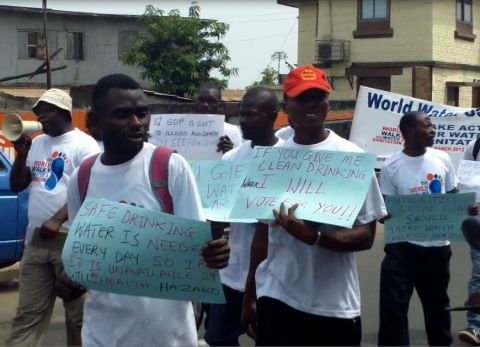
A previous year’s Walk for Water and Sanitation in Freetown
By Jariah Bah
Though the situation has improved, my country, Sierra Leone, is not yet Ebola-free – and there are stark reminders of this, like the Vice President imposing his own 21-day quarantine in late February after the death of his bodyguard.
The reduction in recorded cases is such, though, that we can get down to the business of planning how to avoid serious outbreaks like this happening again.
It does not take a medical expert to deduce that basic sanitation goes a long way in stopping the spread of a disease like Ebola. But with the highest under-five mortality rate worldwide, mostly due to poor access to sanitation and good quality water, the sanitation crisis in Sierra Leone is clear, with or without a short-term crisis to focus minds on the issue.
In Freetown, WASH-Net Sierra Leone, the organisation I am part of, is taking part in the World Walks for Water and Sanitation this month spearheaded by the Ministry of Water Resources – but on a lesser scale than previous years due to the inevitable restrictions on public assembly that come with living in a country battling a disease outbreak.
Building on our partnership with the Government of Sierra Leone, this year’s campaign will primarily focus on massive media engagements, which are also aimed at reducing Ebola infection rates. WASH services and facilities must be in running motion in order to be able to succeed in fully rolling back the spread of the Ebola virus.
WASH-Net, through its member institutions across Sierra Leone’s 14 districts will further embark on publicity keeping the focus on the priority for fulfilling promises in the water and sanitation sector – this key factor in health and wellbeing. We are providing our members across the country with the tools and key talking points to make their voices heard in the Post-Ebola Resilience Planning process.
In particular, we want to support poor and marginalised groups – such those in rural areas especially women, and people with disabilities that are most under-equipped to deal with disease outbreaks – to access safe water, improved sanitation and hygiene as a human right.
Advocacy work around previous World Walks has made a difference, with a commitment to better funding of the sector and the political will to drive sector investments. Civil Society organisations are playing a big role in putting the necessary pressure on here, but also in providing the government with vital information to better target scarce resources and manage financing of schemes across the country.
WASH-Net’s approach in the Water, Sanitation and Hygiene sector is to work in partnership, sharing knowledge and identifying opportunities for joint action. We hope to ultimately help bring about a country where everyone has access to safe water, improved sanitation and hygiene services as part of the development of the country – but at a time of national crisis, goals like these can be made to seem some distance away.
The UN’s Sustainable Development Goals can seem an even more distant thing, but the situation here only goes to underline just why the Human Right to Water and Sanitation is one that must be realised when leaders – local, national and international – are drawing up their long-term plans.
Jariah Bah is Campaign and Communication Officer for WASH-Net Sierra Leone: [email protected]